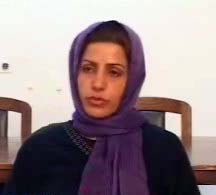An interview with Batool Soltani on MKO self-immolations – Part nine
Sahar Family Foundation: In our last talk you pointed out that the prerequisite for membership in 
Batool Soltani: The organization takes no clear position to directly confront in such instances. To answer the question, we need to conduct a deep analysis of a whole organizational reaction against already confronted cases. There was a female colleague who had refused to volunteer for self-immolation but the organization showed no antagonistic attitude towards her before others. It was not the end of the story and the organization commanded me to watch her closely since they believed that she was in trouble with herself and cared not the least for the organization. They would justify that now even ten days after the detention of Maryam in France, she had refrained to be an abstentious volunteer. In fact, the organization avoided to tackle with these members just before the eyes of others and pretended to overlook them. In this way, many others would be impressed to join the side of majority since the impartiality proved to be a working propaganda to attract more than to repel. Furthermore, nobody could accuse the organization of coercing members into acts of suicide and the acts would be propagated as personal outbursts of passion and consequent of strong devotion to the ideology, Maryam and Massoud. The process of indirect control of the disobedient would continue until through an excuse they would be seriously censured. There were some among the rankings of the Leadership Council who refused to volunteer for suicide operations but after a while were suddenly evanesced from the council. In my opinion, the use of clever mechanisms of control to undermine the dissidents functioned much better than exploiting levers of pressure and coercion. And so far it has succeeded to expand glorification of suicide operation as a token of devotion among the insiders.
SFF: You have already stated that self-immolation as a kind of suicide operation has been innovated by the organization. Can you say exactly when the organization selected it as a working lever, and who was the first to suggest it and for what reason?
BS: Well, I have already explained that the suicide operation is not new but was innate in 
SFF: I mean in its novel form of self-immolation.
BS: Well, it was first conducted to be committed in 17 June operations. We have never witnessed it before.
SFF: To make it more clear, when it was first suggested as a solution and by whom?
BS: It returns to Massoud Rajavi’s last meeting in Camp Ahraf before the fall of Saddam. It was a well known meeting called ‘the meeting of flag’. Of course, the issue was not explicitly mentioned there but it was later discussed in a meeting of the Leadership Council that what should have to be done to defend if Saddam collapsed and Camp Ashraf came under unexpected threat from the outside. For the first time Massoud suggested self-burning as a defensive advantage to safeguard Ashraf. He frankly stated that to repel any threat intended to dismantle Camp Ashraf all had to sacrifice and set themselves on fire. Of course, at the time the organization was not suffering the deteriorating condition of being disarmed and it was still equipped with a variety of heavy and light weapons that could defend itself to some extent. But it seemed that Rajavi was anticipating a near future of invasion that could seriously challenge the organization before it could use its arms. So the best defensive measure was resolved by Rajavi to be suicide through self-immolation. We never saw Massoud again till the manifestation of his novel suggestion in the incidents of 17 June.
SFF: To remind you, I have to point out that the issue of self-immolation emerged for the first time in the letters of the members who wrote them to Massoud Rajavi following his ideological revolution as an indication of devotion to him and his revolution. I remember a letter in Jafarzadeh’s handwriting published by a website in which he had volunteered to commit self-immolation to show his loyalty. These letters date back to 1985 and I mean to say that the issue was first proposed at that time as the letters indicate. Furthermore, even when France was expelling some members to Gabon, Maryam Rajavi is quoted to have said Massoud Rajavi had stopped remonstrant self-immolations as a raised objection against the decision taken by France. Your reference to the meeting dates back to 2002, then, can you remember any earlier occasion when the issue came under notice?
BS: To correct, I was not in the organization at the time you are referring to. I joined in mid 1980s and I have seen none of the things you say in the sources published by the organization.
SFF: All of the instances I stated you can find in the publications of the organization if you have access to them.
BS: It seems that my information as a member of the organization fails to surpass that of yours. I would be grateful if you could give me the address to these sources.
